

Siemens tools in mooc. Supporting Students in Online, Open and Distance Learning: Third Edition - Ormond Simpson.
A Handbook for Adjunct & Part-Time Faculty Who Teach Online, Revised 1st Edition, The Part-Time Press. For Online Faculty by Evelyn Beck and Donald Greive, Ed.D.
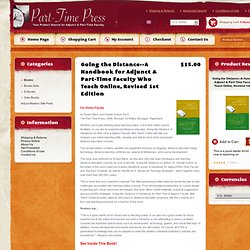
The Part-Time Press, 2008, Revised 1st Edition 96 pages. Paperback. Whether you're just thinking about teaching online, a first-time online course facilitator, or you are an experienced distance educator, Going the Distance: A Handbook for Part-Time & Adjunct Faculty Who Teach Online will help you sharpen your online teaching skills, develop and deliver more richly-structured distance education courses. The revised edition contains updated and expanded sections on blogging, distance education blogs, technology, distance learning conferences, awards & fellowships, and course development.
This book was authored by Evelyn Beck, an educator who has been developing and teaching distance education courses for over a decade. This is more than just a teacher's manual! Readers say.... "This is a good starter kit for those new to teaching online. See Inside This Book! To download the Table of Contents in PDF format, click here. ABC: 10 reasons NOT to create a course and 10 other options. My colleague, Clark Quinn, recently wrote a blog post, Yes, you do have to change, in which he explained how he felt that “the elearning industry, and the broader learning industry, is severely underperforming the potential”.
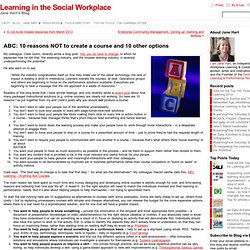
He also went on to say: “While the industry congratulates itself on how they make use of the latest technology, the lack of impact is leading a drive to irrelevancy. Learners tolerate the courses, at best. Operations groups and others are beginning to focus on the performance solutions available. Executives are beginning to hear a message that the old approach is a waste of resources.” Readers of this blog know that I have similar feelings, and only recently wrote a recent post about how many packaged instructional solutions (e.g. online courses) are clearly not working. Clark says “The best way to change is to take that first step.”
To start the ball running here are 10 suggestions as alternatives to courses (with some examples). Professors, Pedagogy and MOOCs. The MOOC Model: Challenging Traditional Education (EDUCAUSE Review. Key Takeaways A turning point will occur in the higher education model when a MOOC-based program of study leads to a degree from an accredited institution — a trend that has already begun to develop.
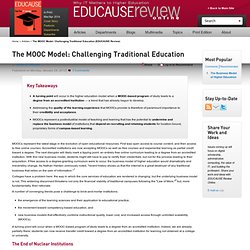
Addressing the quality of the learning experience that MOOCs provide is therefore of paramount importance to their credibility and acceptance. MOOCs represent a postindustrial model of teaching and learning that has the potential to undermine and replace the business model of institutions that depend on recruiting and retaining students for location-bound, proprietary forms of campus-based learning. MOOCs represent the latest stage in the evolution of open educational resources. Here's what MOOC instructors really think about online learning. Emerging Student Patterns in MOOCs: A Graphical View. Update (3/10): Patterns and descriptions have been updated based on feedback in a new post.
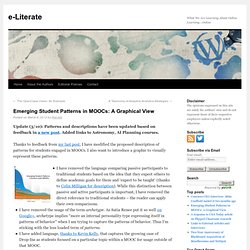
Added links to Astronomy, AI Planning courses. Thanks to feedback from my last post, I have modified the proposed description of patterns for students engaged in MOOCs. I also want to introduce a graphic to visually represent these patterns. I have removed the language comparing passive participants to traditional students based on the idea that they expect others to define academic goals for them and ‘expect to be taught’ (thanks to Colin Milligan for description).
While this distinction between passive and active participants is important, I have removed the direct reference to traditional students – the reader can apply their own comparisons.I have removed the usage of the term archetype. As a recap, I believe we are seeing the following four patterns of student behavior within MOOCs: Additional Notes on Behavior I have already described the data captured by Katy Jordan on MOOC completion rates. Hacking the Classroom: Beyond Design Thinking. Design Thinking is trending is some educational circles.
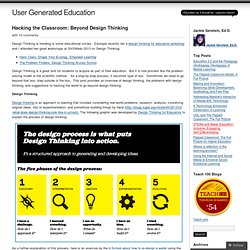
Edutopia recently ran a design thinking for educators workshop and I attended two great workshops at SXSWedu 2013 on Design Thinking: Design Thinking is a great skill for students to acquire as part of their education. But it is one process like the problem-solving model or the scientific method. As a step-by-step process, it becomes type of box. Sometimes we need to go beyond that box; step outside of the box. Accommodating Learner Diversity in Web-based Learning Environments. Design Thinking Is A Failed Experiment. So What's Next? The decade of Design Thinking is ending and I, for one, am moving on to another conceptual framework: Creative Intelligence, or CQ.
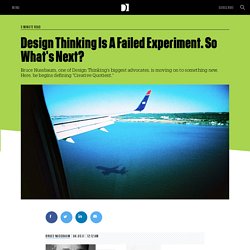
I am writing a book about Creative Intelligence, due out from HarperCollins in fall 2012, and I hope to have a conversation with the Fast Company audience on this blog about how we should teach, measure, and use CQ. Why am I, who at Business Week was one of Design Thinking's major advocates, moving on to a new conceptual framework? Simple. Design Thinking has given the design profession and society at large all the benefits it has to offer and is beginning to ossify and actually do harm. Helen Walters, my wonderful colleague at Business Week, lays out many of the pros and cons of Design Thinking in her post on her blog. Design consultancies hoped that a process trick would produce change. I would add that the construction and framing of Design Thinking itself has become a key issue.
There were many successes, but far too many more failures in this endeavor. ID Models. ERIC PDF Download. Online Education vs. Traditional Learning: Time to End the Family Feud. The Emergence of For-Profit E-learning Providers in Asia. UC Online Strives to Compete in an Era of Free Courses. Educating the Future: The End of Mediocrity. Into the Future With MOOC's. COLLEGE STUDENT PREFERENCES FOR ABSOLUTE KNOWLEDGE AND PERSPECTIVE IN INSTR. For Making the Most of College, It's Still Location, Location, Location. Education Group Recommends 5 MOOCs for Credit. MOOC Mania. Much Ado about MOOCs. Will MOOCs Destroy Academia? ERIC PDF Download.